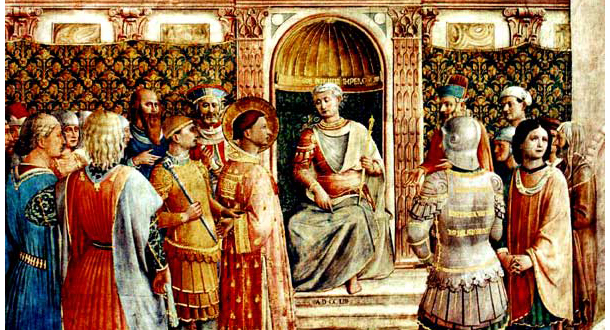
Memorial of Saint Justin, Martyr
Scripture:
Reflection:
Today the church remembers one of the great early martyrs who was also a philosopher and theologian. Justin, who was born in present day Nablus, a city in Palestine, had a long intellectual journey before arriving at his strong faith in Jesus Christ and the Christian view of life. He had tried several other philosophies as guides in seeking God but ultimately was impressed with the virtues and quality of life of the Christians and this drew him to his new faith. He, and several of his students, were beheaded in Rome about 165 AD because they refused to submit to emperor worship.
While the readings for today were not selected specifically in memory of Justin, a connection can be found. The first reading is from the First Letter of Peter, one of the New Testament’s most beautiful books. The purported author Peter writes to several churches located in Asia Minor, present day Turkey. A strong emphasis of the letter is that the Christians should give the witness of a virtuous life to their surrounding non-Christian neighbors. A famous verse in this letter—not included in this selection—asks the Christians to always be ready, when asked to give an account of the reason for their hope—but to do so with gentleness and respect.
The quality of the Christian community’s own inner life is also meant to be a public witness. In the passage we hear at today’s Mass, the author urges his Christians “let your love for one another be intense…” “Be hospitable to one another without complaining. As each one has received a gift, use it to serve one another as good stewards of God’s varied grace. Whoever preaches, let it be with the words of God; whoever serves, let it be with the strength that God supplies, so that in all things God may be glorified through Jesus Christ.”
The Gospel of Mark’s dramatic account of Jesus’ purifying the temple makes a similar point about doing good but in a very different mode. On the way into Jerusalem from Bethany, Jesus discovers a fig tree that does not have any fruit on it and condemns it! And then comes his strong action in the temple, acclaiming that the behavior of those frequenting the temple had transformed it from being a “house of prayer for all peoples” into a “den of thieves.” When Jesus and his disciples head back to Bethany to spend the night, they discover that the fig tree had withered. In effect, the evangelist uses this strange incident of a barren fig tree as a commentary on the misuse of the Temple. The scene concludes with Jesus reminding his startled disciples that when they pray they should first “forgive anyone against whom you have a grievance, so that your heavenly Father may in turn forgive you your transgressions.
Authentic faith and piety should make a difference in the manner of our life, particularly how we treat others. Justin’s experience and Jesus’ condemnation of false piety remind us of the powerful witness that comes with authentic Christian virtue.
Fr. Donald Senior, C.P. is President Emeritus and Professor of New Testament at Catholic Theological Union. He lives at the Passionist residence in the Hyde Park neighborhood of Chicago.
